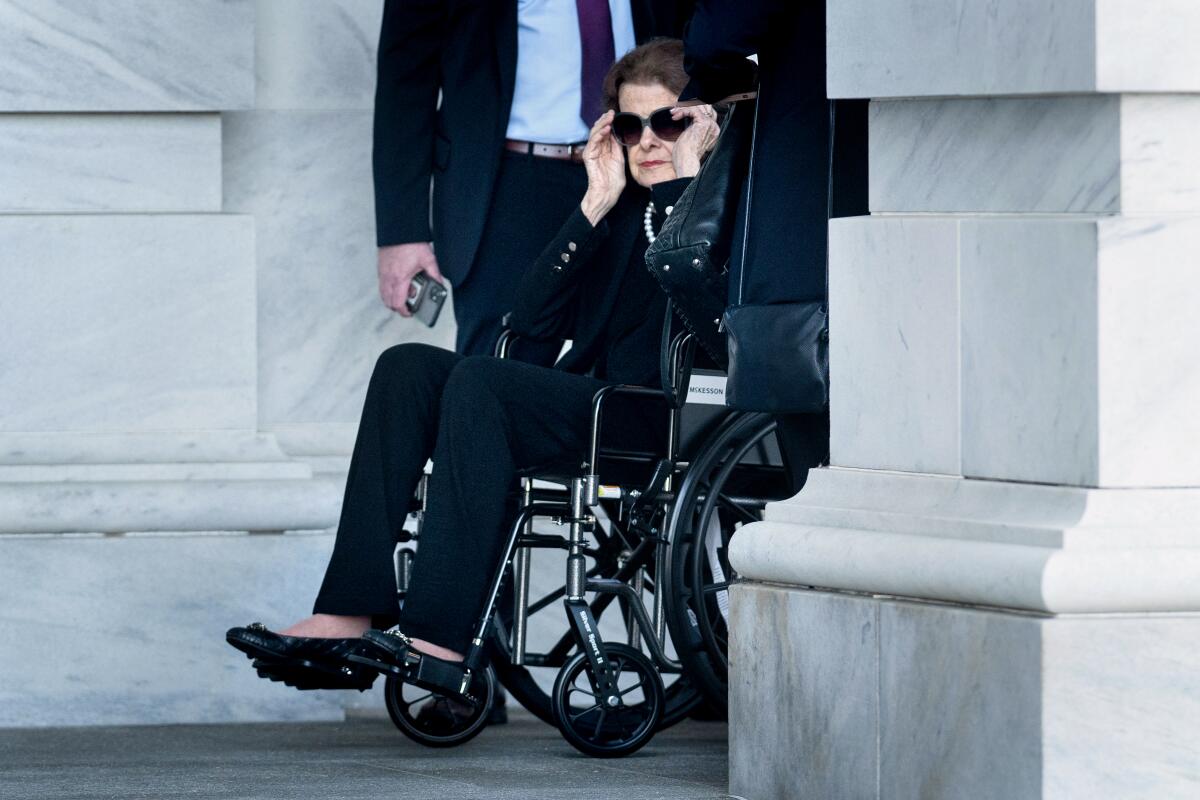Sen. Feinstein’s decline and death renew discussion about term limits

- Share via
WASHINGTON — Sen. Dianne Feinstein’s death while in office has reignited a discussion about congressional term limits, and an ongoing, uncomfortable conversation about the age of elected public officials.
Feinstein, who at 90 was the oldest serving U.S. senator, was in her fifth full term. First elected to the Senate in 1992, she had defied calls for her resignation in recent years as she faced health complications. However, in February, she announced she would not seek reelection next year to serve beyond January 2025, when her term was to end.
A poll released this month by the Pew Research Center found that there was “overwhelming” public support for congressional term limits, with 87% of those surveyed in favor. The polling also found widespread support among adults for imposing age limits on elected politicians in Washington (79%) and for Supreme Court justices (74%).
Congressional term limits have garnered support among Republicans in Congress including members of the hard-right House Freedom Caucus, who demanded a vote on the issue as part of their deal to support Kevin McCarthy (R-Bakersfield) during his difficult run for the speakership.
But congressional Democrats have been lukewarm on the idea, with several octogenarian politicians in their party, including President Biden and former House Speaker Nancy Pelosi, along with independent Vermont Sen. Bernie Sanders, who caucuses with Democrats.
In January, Sen. Ted Cruz (R-Texas) reintroduced a bill that would amend the Constitution and cap senators at two six-year terms and House members at three two-year terms.
“The Founding Fathers envisioned a government of citizen legislators who would serve for a few years and return home, not a government run by a small group of special interests and lifelong, permanently entrenched politicians who prey upon the brokenness of Washington to govern in a manner that is totally unaccountable to the American people,” Cruz said earlier this year. He is running for a third term in 2024.
Calls for congressional term limits heightened following Feinstein’s lengthy absence from Capitol Hill earlier this year as she recovered from a shingles infection. The debate was revived when Senate Minority Leader Mitch McConnell (R-Ky.), who is 81, appeared to freeze and was unable to talk during two news conferences this summer.
Casey Burgat, legislative affairs program director at George Washington University, said term limits have public support because “Congress is incredibly unpopular and doesn’t fulfill a lot of its basic obligations.”
However, Burgat said, instituting term limits would upend the rights of voters.
“Feinstein won an election four years ago when obviously her age was well known,” Burgat said. “The voters saw her compared to the alternatives and chose her to continue her career. To institute draconian measures such as term limits that kick out good politicians, bad politicians, all at the same pace takes away the fundamental right for voters to choose who they want to represent them.”
“We have presidential term limits because we realize that putting too much power in one person’s hand for a long period of time is not a good thing, and the people agree that the same thing should apply to Congress,” said Scott Tillman, national field director of U.S. Term Limits, an organization that advocates for caps in state legislatures and on the federal level.
In 1995, U.S. Term Limits was party to a Supreme Court case that barred states from imposing term limits or congressional qualifications in addition to those enumerated in the Constitution.
In a 5-4 majority opinion, Justice John Paul Stevens said that “such a state-imposed restriction is contrary to the fundamental principle of our representative democracy, embodied in the constitution, that the people should choose whom they please to govern them.”
Burgat said term limits would lead to a revolving door of lawmakers and a loss of institutional knowledge about federal policymaking that comes with experience in Congress.
“If that experience is not in house, then you go find it out of house — and in politics, that means special interest groups, that means lobbyists,” he said. “The deference would increase to special interest groups and an executive branch who have longer-serving bureaucrats who, by the way, are unelected.”
More to Read
Get the L.A. Times Politics newsletter
Deeply reported insights into legislation, politics and policy from Sacramento, Washington and beyond. In your inbox twice per week.
You may occasionally receive promotional content from the Los Angeles Times.











